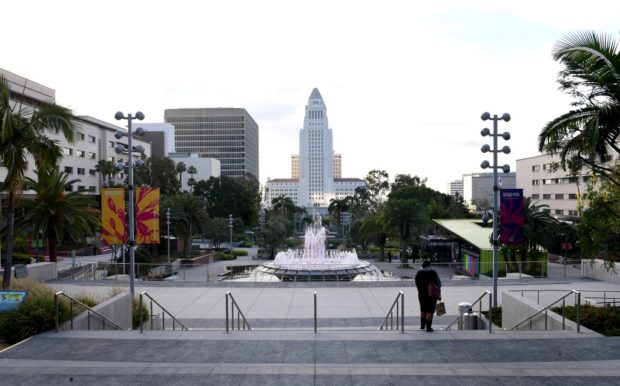Virus adds to constant fear of life as undocumented immigrant

A lone pedestrian walks toward City Hall on March 20, 2020 in Los Angeles, California a day after Los Angeles County announced a near-lockdown, urging all residents to stay home except for essential needs. Photo by Frederic J. BROWN / AFP
LOS ANGELES — James can’t afford to quarantine: he lost his job as a waiter in a Los Angeles restaurant and is two weeks away from running out of money for rent and food.
But as an undocumented immigrant, the 30-year-old Colombian cannot turn to the social aid programs being offered by the US government to deal with the coronavirus pandemic.
James is not his real name. It is the name on his fake social security card that, like many in his precarious position, he uses to get low-paying, hourly jobs.
He usually gets by on around $400 a week.
“I have to find a way to at least cover rent and food, and with this situation, getting a job is complicated,” he told AFP.
Life as an undocumented immigrant is always anxiety-inducing, especially since Donald Trump became president having campaigned on a promise to crack down on illegal immigration.
Now there is the extra pressure of the pandemic, which has killed 417 people in the US out of more than 33,000 confirmed cases.
‘Health first’
Luz Gallegos, from the TODEC non-profit which provides legal help to immigrants, held a workshop last weekend in a rural community north of Los Angeles.
Questions included: can I go to the hospital without insurance? Am I in danger of being deported? If I use government services for coronavirus, will it hurt me later applying for residency?
“COVID-19 is an additional stress for the community,” Gallegos said. “It’s a community that doesn’t trust the government.”
TODEC’s message is “health first” — but that does not erase the issue.
Many immigrants’ chief concern is the new “public charge” rule, which allows health issues to be considered when granting visas or permanent residency.
US immigration officials insist medical tests to detect coronavirus or receive treatment for the disease will not be penalized.
Immigration and Customs Enforcement also announced it will temporarily stop arrests and deportations of undocumented immigrants during the crisis.
But uncertainty over the law means fear persists, especially as “the Trump administration keeps on changing” its policies on handling immigrants, said Gallegos.
‘Start over’
The US has pledged $100 billion in social aid for workers directly hit by the fallout from the coronavirus pandemic.
This includes paid leave for employees who fall ill, and easier access to unemployment benefits and food stamps for those who lose their jobs.
But these benefits can appear unattainable for the country’s 11 million undocumented, many of whom are Latino.
“When we were notified that our jobs were gone, we were given a link to apply for government aid,” said James.
“But I read that it’s for citizens who have fully legal social security.”
Although California is a “sanctuary state” for immigrants, half of the 15 staff at his Japanese restaurant have no papers and remain concerned.
“I think the situation will get more difficult in 15 days, a month, when we can’t afford rent and bills,” said the young man, who pays $580 per month for a small room.
His immediate plan is to deliver goods using a second-hand car he bought just two weeks ago, before the crisis struck.
“After two years in this country I finally felt at the point where I was getting my life organized,” he said.
“And then this coronavirus thing came.”
For more news about the novel coronavirus click here.
What you need to know about Coronavirus.
For more information on COVID-19, call the DOH Hotline: (02) 86517800 local 1149/1150.
The Inquirer Foundation supports our healthcare frontliners and is still accepting cash donations to be deposited at Banco de Oro (BDO) current account #007960018860 or donate through PayMaya using this link.


















